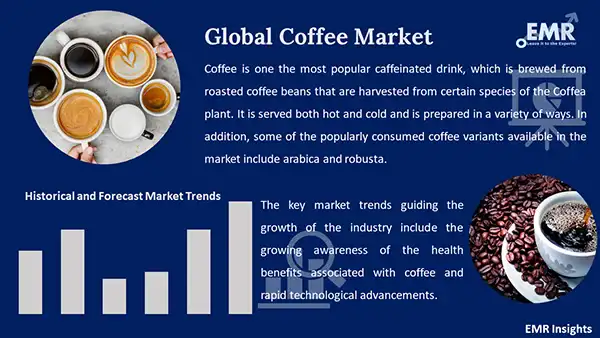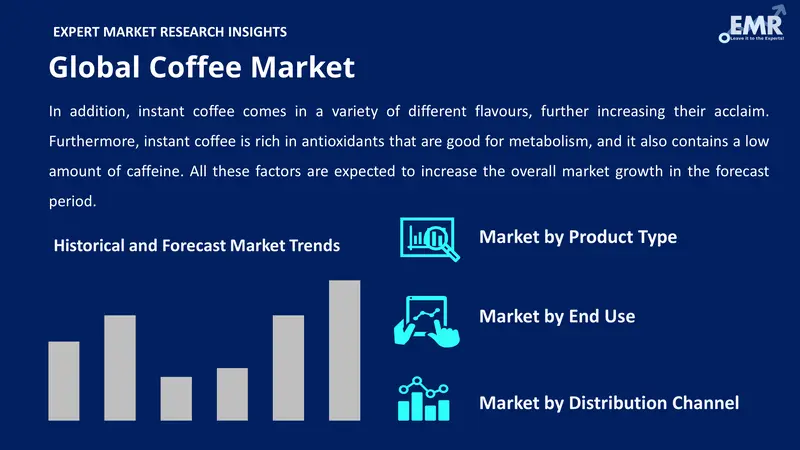
Consumer Insights
Uncover trends and behaviors shaping consumer choices today
Procurement Insights
Optimize your sourcing strategy with key market data
Industry Stats
Stay ahead with the latest trends and market analysis.
Trending Now



The global coffee market was valued at approximately USD 138.15 Billion in 2024. It is projected to grow at a CAGR of 4.60% in the forecast period of 2025-2034, reaching an estimated USD 216.60 Billion by 2034. The market is witnessing robust growth, fuelled by changing lifestyles and a rising demand for premium coffee. This expansion is particularly notable in emerging markets, where the appetite for quality coffee is growing rapidly. Coffee consumption has seen a significant uptick, with the U.S. leading the way in both production and consumption. According to the National Coffee Association, the popularity of coffee in these regions is reshaping the market landscape. The global coffee market is also benefiting from the growing presence of speciality coffee shops, further influencing trends. As the coffee market evolves, its reach continues to expand, with diverse consumer preferences being catered to worldwide.
Base Year
Historical Year
Forecast Year
Coffee is one of the top traded commodities in the world, and its largest producer is Brazil with around 2.6 million metric tonnes produced on average a year.
Reportedly, in 2022, 66% of Americans drank coffee on a daily basis, rising by 14% since January 2021.
As per coffee market analysis, Asia & Oceania, and Africa’s coffee production decreased by 4.7% and 7.2% respectively owing to adverse weather conditions.






Value in USD Billion
2025-2034
Coffee Market Outlook
*this image is indicative*
Read more about this report - REQUEST FREE SAMPLE COPY IN PDF
Increasing popularity of instant coffee; rising popularity of specialty coffee houses; and the growing use of milk alternatives are positively impacting the coffee market opportunities.
Instant coffee is increasingly preferred by coffee enthusiasts as well as institutions owing to its convenience, affordability, and accessibility. This has significantly enhanced the coffee industry growth worldwide.
Consumers increasingly seek unique and high-quality coffee experiences. As a result, specialty coffee shops, while offering artisanal coffee, are also promoting value-added baked goods and local products as well as targeting eco-conscious consumers.
Plant-based milk, such as almond and soy milk, has become popular in coffee, contributing to the growth of the alternative milk beverage sector and coffee creamer sales and pushing coffee demand.
Coffee shops are increasingly focusing on reducing packaging waste, notably single-use coffee cups, with initiatives to promote recycling and reusable cups.
The global coffee market is evolving with a strong demand for specialty coffee, gourmet coffee, and organic options. Consumers are increasingly favouring premium and high-quality roasted coffee, including single-origin varieties, as trends shift towards sustainable sourcing and ethical practices. Coffee producers, roasters, and retailers are responding to consumer preferences with innovative products like coffee pods and capsules. According to the FAO, Brazil remained the leader in global coffee production in 2022, producing 3.17 million tonnes, while India followed with 338,619.22 tonnes, reinforcing its important contribution to both specialty coffee and gourmet coffee markets. The market for gourmet coffee is growing, driven by a desire for unique flavours and quality. Specialty coffee is at the forefront of this transformation, as consumer demand for distinctive, sustainable coffee continues to rise.
The global coffee market faces various challenges, with coffee beans production or coffee harvest is affected by unpredictable weather conditions, natural disasters, and diseases like coffee rust. In 2022, Brazil, Vietnam, and Colombia were key producers, but their coffee harvests were impacted by these factors, leading to reduced supply. According to USDA data, Australia imported 200,060 kilograms of roasted and ground coffee during the 2022/23 period. Geopolitical issues further disrupted the coffee supply chain, influencing prices. Coffee plants in these regions also struggled with the spread of diseases, particularly coffee rust, affecting the overall production. As a result, fluctuating market dynamics have shaped the coffee market, with changes in production volumes influencing global supply and prices.
The global coffee market is experiencing shifts driven by changing demographics and evolving consumer preferences. Millennials and Gen Z are becoming key coffee consumers, seeking specialty coffee with unique flavors and decaffeinated options. According to National Coffee Data Trends (NCDT), these younger generations are increasingly attracted to sustainable sourcing practices, prioritising ethical production. At the same time, the aging population is driving demand for milder coffee options. Age distribution plays a significant role in shaping lifestyles, with millennials and gen z consumers favouring innovation in the coffee sector, while older consumers seek familiar tastes. The growing demand for quality, sustainable coffee is reshaping the market landscape.

Read more about this report - REQUEST FREE SAMPLE COPY IN PDF
Global coffee consumption patterns are evolving as health and wellness become a growing focus. Moderate coffee consumption is widely acknowledged for its health benefits, including antioxidants supporting brain health and help reduce the risk of diabetes. Many studies also suggest that moderate intake may contribute to increasing longevity and supporting heart health. However, excessive consumption of coffee can lead to negative health effects, including caffeine-related issues such as anxiety, insomnia, and gastrointestinal disturbances. Consumer attitudes and preferences are shifting as people become more mindful of their caffeine intake, balancing the health benefits of coffee with the potential risks. This shift is influencing market growth and shaping future consumption of coffee.
The global coffee market is seeing significant innovation as consumer preferences shift towards new brewing methods and premium offerings. Technology is driving the rise of cold brew and nitro coffee, along with ready-to-drink options that cater to busy lifestyles. Specialty coffee made from single-origin beans with unique flavour profiles is gaining popularity, while sustainable sourcing practices are increasingly prioritised. Consumers are seeking high-quality, environmentally conscious products, which has led to a growing demand for specialty coffee, highlighting the evolving trends in the coffee market.
The coffee market is witnessing increased merger and acquisition activity, driven by the industry's dynamic nature. Major players are focusing on consolidation and expanding portfolios to enter new markets and enhance synergies and operational efficiency. Specialty coffee brands and technology-driven companies are adapting to evolving consumer demands, while sustainable coffee ventures are gaining traction. This competitive landscape reflects the market's shift towards innovation and sustainability, as companies respond to changing consumer preferences and market opportunities.
The coffee market is increasingly influenced by regulations, including food safety regulations and environmental regulations, which shape product standards and operational practices. Coffee producers must adhere to strict quality controls and traceability measures throughout the supply chain to meet health and safety standards. These regulations also drive improvements in coffee production practices, encouraging the adoption of sustainable farming methods. As consumer demand grows, addressing the industry's carbon footprint becomes crucial, ensuring coffee products meet both regulatory requirements and sustainability goals.
The coffee market is evolving, with increasing demand for product substitutes, such as tea, matcha, and herbal infusions, which offer varied flavors and different caffeine levels. Consumer choices are influenced by health benefits and dietary restrictions, driving interest in plant-based coffee substitutes and chicory or barley-based drinks. The rise of ready-to-drink beverages and functional drinks further alters market dynamics, as consumers seek convenient alternatives (e.g., tea, matcha, herbal infusions) to traditional coffee. With caffeine levels being a key consideration, many consumers are opting for these product substitutes to explore unique taste experiences while maintaining a focus on health and wellness.
The coffee market is shaped by end-user concentration, with diverse consumer segments influencing demand. Individual consumers and businesses, including coffee shops, restaurants, and offices, have unique preferences based on demographics such as age, income, and lifestyle. The demand for coffee products, including premium blends and ready-to-drink options, continues to grow as consumers seek convenience and quality. As individual consumer preferences evolve, the market adapts to cater to a wide range of tastes and needs.

Read more about this report - REQUEST FREE SAMPLE COPY IN PDF
The coffee market has seen significant growth, driven by the increased consumption of roasted coffee. With global revenue rising, coffee culture is expanding, especially through coffee shop chains like Starbucks, which has popularised the coffee shop experience worldwide. Consumers are increasingly seeking premium quality, freshly roasted coffee, including specialty coffee and craft coffee, which offer distinct flavour profiles. Sales of roasted coffee, as well as coffee beans and brewing equipment, have surged as home brewing becomes more popular. In February 2023, Starbucks launched an olive oil coffee in Italy, with plans to expand to the UK. The chain promoted the drink, infused with extra virgin olive oil, as offering a unique flavour and texture. The Oleato range featured drinks like Olive Oil Caffe Latte, Cold Brew, and Iced Shaken Espresso. Coffee enthusiasts now demand unique, high-quality coffee experiences, whether from freshly roasted beans or in the vibrant atmosphere of coffee shops.
The ready to drink coffee market is experiencing significant growth, driven by the increasing demand for convenient options among consumers with busy, hectic lifestyles. With a growing CAGR, the popularity of RTD coffee is increasing as more people opt for quick, hassle-free coffee beverages that don’t require brewing. RTD coffee offers a variety of flavors and formulations, catering to diverse consumer preferences. Coffee shops and brands are expanding their RTD coffee offerings, providing unique blends and formulations that appeal to a wide audience. This trend highlights the shift in consumer behaviour towards more convenient, ready-to-drink coffee options as part of their daily routine.
The coffee market continues to see high demand for conventional coffee, which is produced on a larger scale due to mass production and distribution. As conventional coffee benefits from economies of scale, it remains more affordable, catering to a price-sensitive consumer base. This allows it to maintain a significant share of global revenue. In contrast, organic coffee, although growing in popularity, is less widely produced and typically comes at a higher price point. Despite this, the high demand for both conventional coffee and organic coffee showcases the diversity in consumer preferences and willingness to pay for quality.
The organic coffee market is experiencing significant growth, with a CAGR driven by increased consumer awareness of health and environmental concerns. Organic coffee, produced without synthetic pesticides and fertilizers, appeals to consumers seeking healthier and more sustainable options. The environmental impact of conventional coffee production has prompted a shift towards organic coffee, which supports environmentally friendly practices. As more people recognise the benefits of organic coffee, there is an increased demand for it, encouraging more farmers to adopt organic coffee production methods, contributing to a healthier planet and promoting sustainability within the coffee industry.
The coffee market is witnessing a shift in sales channels, with both B2B channel and B2C channels playing pivotal roles. The global revenue for specialty coffees continues to rise, driven by the growing specialty coffee culture and increasing demand for unique, high-quality coffee beans. Coffee producers, roasters, and brands are expanding their reach through various channels, including hypermarkets, convenience stores, specialty stores, and online platforms. E-commerce and direct-to-consumer sales models are also becoming more prominent, allowing consumers to purchase specialty coffees directly. Traditional retail channels still play a significant role, but the focus on specialty coffees through diverse sales channels reflects changing consumer preferences for premium
The coffee market is experiencing robust growth, with coffee sales in both B2C and B2B driving a strong CAGR. B2C channels, including e-commerce and retail outlets, are expanding as consumers seek premium coffee experiences. Meanwhile, B2B coffee sales, particularly for bulk purchases, continue to thrive in restaurants, cafes, hotels, and other establishments. This shift in supply and demand has also led to a rise in customization, with businesses offering custom blends, packaging, and branding to cater to diverse preferences. As the global market grows, both B2C and B2B coffee sales are shaping the future of the global coffee industry, meeting the increasing demand for quality and personalised coffee experiences.
The HoReCa sector plays a crucial role in the global coffee market, as demand for specialty coffee continues to rise among consumers seeking premium beverages in dining and hospitality settings. Coffee shops, cafes, restaurants, and hotels are increasingly focused on offering high-quality coffee experiences, contributing to market growth. With innovations in brewing methods, from espresso machines to pour-over techniques, and the rise of plant-based milk alternatives, businesses are adapting to consumer preferences for both taste and sustainability. Additionally, premium coffee blends and personalised options are popular, encouraging establishments to offer unique experiences and maintain customer loyalty in a highly competitive industry.
In the global coffee market, the retail sector has seen significant expansion due to growing consumer interest in home brewing. Supermarkets, convenience stores, and online retailers offer a variety of coffee products, ranging from whole beans to ground coffee and single-serve pods. As more people seek premium and specialty coffee at home, brands are emphasising quality, ethical sourcing, and sustainability. Additionally, with the increasing popularity of subscription services and direct-to-consumer sales, coffee retailers are tapping into evolving consumer behaviour. The growth of the retail coffee segment reflects the broader shift toward personalised, at-home coffee experiences and an emphasis on convenience.
The coffee market in North America continues to drive global revenue, with a growing popularity of roasted coffee. Both light roast and dark roast varieties cater to individual tastes and preferences, contributing to the expanding market growth. Coffee consumption in the region is increasing, particularly with the rise of coffee chains like Starbucks, which has popularised different roasted coffee options. As consumer demand for diverse coffee flavours grows, North America's coffee market is thriving, reflecting a strong shift in preferences and a continued rise in the demand for roasted coffee across various formats and blends.
The U.S. coffee market is experiencing strong growth, with a notable increase in coffee consumption and demand for roasted coffee. Consumer preferences in the U.S. are shifting towards higher-quality, specialty coffees, contributing to the market's impressive CAGR. The growing popularity of coffee in the U.S. is also supported by health-conscious consumers, with the FDA continuing to monitor coffee's impact on health. The increased demand for diverse coffee options reflects a broader trend of consumers seeking more flavourful and premium coffee experiences. As the U.S. coffee market evolves, it continues to expand, driven by changing consumer behaviours and a rising appreciation for roasted coffee varieties.
The Europe coffee market is witnessing significant growth, driven by consumers' increasing preference for high-quality coffees. As part of the global market, Europe has become a key player in the demand for specialty coffee, with an expanding number of specialty coffee shops and established coffee shops offering unique brews. Arabica and Robusta beans continue to dominate in terms of popularity, with suppliers and exporters from various regions meeting the growing demand. European consumers are seeking premium coffee experiences, contributing to the rise of high-quality coffees in the market. The shift towards specialty coffee reflects a broader trend in Europe, as more consumers prioritise flavour and quality over traditional coffee offerings. This growing interest in fine coffee is reshaping the coffee market in Europe, boosting both domestic and international supply chains.
The UK coffee market is projected to grow significantly, with a CAGR reflecting the rising demand for specialty and premium coffees. According to the British Coffee Association, regular coffee consumption in the UK continues to increase, with British consumers now enjoying more cups of coffee daily. This significant growth is driven by a shift towards higher-quality coffee options, as people seek unique and premium brews. The UK coffee market is seeing a rise in specialty coffees, further boosting the sector. As the coffee culture in the UK flourishes, the number of cups of coffee consumed daily reflects changing consumer preferences and habits.
Asia Pacific Coffee Market Trends
The Asia Pacific coffee market is experiencing strong growth, driven by a CAGR fuelled by the region’s evolving coffee culture. Asian countries are increasingly adopting Western coffee trends, especially among the younger, cosmopolitan population in urban areas. Coffee shops are becoming more popular, and café culture is thriving alongside the rise of specialty coffees. This shift reflects global trends, as consumers in the region embrace new coffee experiences, blending traditional practices with modern influences. According to the Coffee Board of India, the post blossom estimate for 2023-2024 is 113,000, while the final estimate for 2022-2023 is 100,000. The growing coffee culture in Asia Pacific is reshaping the coffee market, particularly in urban areas.
The Japan coffee market is contributing significantly to global revenue, with a rising trend in coffee consumption. Japanese consumers are increasingly embracing coffee culture, particularly specialty coffee, which offers unique flavours and distinct profiles. The demand for premium roasted coffee beans is growing, as coffee drinkers seek higher-quality options. This shift towards unique coffee experiences reflects a broader appreciation for the diverse flavours that specialty coffees provide, helping to shape the future of coffee consumption in Japan and beyond.
Key players in the global coffee market include major brands such as Starbucks, Nestlé, Dunkin', and Lavazza. These companies drive market growth through innovation, expanding product offerings, and adopting sustainable practices. They influence consumer preferences by providing high-quality coffees, specialty blends, and convenience options, shaping the competitive landscape and meeting the evolving demands of coffee consumers worldwide.
Founded in 1866, Nestlé, with headquarters in Vevey, Switzerland, is the world leader in coffee sales because of the high demand for its renowned brands Nescafé and Nespresso. Forgoing ease in dominant positions, Nestle has a rather wide portfolio that ranges from instant coffee all the way to the more premium capsules and a large distribution network worldwide.
JDE Peet’s base is in Amsterdam, and it was founded in 2019, unique for holding under its portfolio a broad range of coffee brands such as Jacobs, Douwe Egberts, and Peet's Coffee. The company dominates the retail and out-of-home playing field, having deeply penetrated the market and stamped global presence.
Starbucks Corporation is headquartered in Seattle, United States, and was founded in the year 1971. Major claims to fame include coffeehouses and premium positioning. Quality standards at Starbucks are set very high, if not for the industry, at least for customer experience on any other ground; this has helped it maintain global leadership in the coffee sector.
Based in Chicago, United States, and founded in the year 2015, The Kraft Heinz Company has been able to bank on its deep portfolio of brands which Maxwell House for wider outreach of the customers. Its marketing and distribution expertise puts it to the front for the mass coffee market.
Founded in 1895 and headquartered in Piemonte, Italy, Lavazza is an organisation that deals with high-end coffee products. Combining its traditional heritage and excellence of products, the company provides a range of whole-bean, ground, and capsule coffee catering to discerning coffee lovers worldwide.
The group Strauss was founded in the year 1939 with its headquarter in Petah Tikva, Israel. It has been trying to enhance its position by focusing on the emerging markets through the business unit Strauss Coffee. It offers various types of roast, ground, and instant coffee products to jostle for growth through joint ventures and acquisitions.
The J.M. Smucker Company is an Ohio-based corporation founded in 1897 and is known more for their fruit spreads and peanut butter products. It also owns Folgers and Café Bustelo, their coffee companies that target coffee consumers of the widest variety.
JAB Holding Company is a "Luxemburg-based holding company founded in 2012 involved in luxury goods, health, and wellness along with fast-casual eateries." Its portfolio includes Keurig Dr Pepper, Jacobs Douwe Egberts, and Peet's Coffee, among others.
*Please note that this is only a partial list; the complete list of key players is available in the full report. Additionally, the list of key players can be customized to better suit your needs.*
The companies listed below are the key players in the coffee market. They dominate the market share and influence industry trends.
“Global Coffee Market Report and Forecast 2025-2034” offers a detailed analysis of the market based on the following segments:
Product Outlook (Revenue, Billion, 2025-2034)
Nature Outlook (Revenue, Billion, 2025-2034)
End Use Outlook (Revenue, Billion, 2025-2034)
Distribution Channel Outlook (Revenue, Billion, 2025-2034)
Region Outlook (Revenue, Billion, 2025-2034)
Coffee Market Regional Analysis
Trade Surveillance System Market
Injection Moulding Machine Market
Optical Brightening Agents Market
Mexico Paints And Coatings Market
South Africa Conveyor Belt Market
*While we strive to always give you current and accurate information, the numbers depicted on the website are indicative and may differ from the actual numbers in the main report. At Expert Market Research, we aim to bring you the latest insights and trends in the market. Using our analyses and forecasts, stakeholders can understand the market dynamics, navigate challenges, and capitalize on opportunities to make data-driven strategic decisions.*
Get in touch with us for a customized solution tailored to your unique requirements and save upto 35%!
In 2024, the coffee market reached an approximate value of USD 138.15 Billion.
The market is estimated to grow at a CAGR of 4.60% between 2025 and 2034.
The market is estimated to witness healthy growth in the forecast period of 2025-2034 to reach a value of around USD 216.60 Billion by 2034.
Changing consumer preferences and trends significantly influence the coffee market. Elements like the rising demand for specialty and gourmet coffees, organic and sustainable sourcing, and the growing popularity of premium and single-origin coffee varieties all affect market dynamics.
The key trends guiding the growth of the market include the growing awareness of the health benefits associated with coffee and rapid technological advancements.
The major regional markets for coffee are North America, Latin America, the Middle East and Africa, Europe, and the Asia Pacific.
The major distribution channels for coffee include hypermarkets and supermarkets, convenience stores, speciality stores, and online, among others.
The key players in the global coffee market include Nestlé, Starbucks Coffee Company, JDE Peet's, Tchibo Coffee, LUIGI LAVAZZA SPA, Strauss Coffee BV, The J.M. Smucker Company, Melitta, UCC UESHIMA COFFEE CO., LTD., Massimo Zanetti Beverage USA, The Kraft Heinz Company, JAB Holding Company, Tata Consumer Products Limited, UCC Europe Limited, Gloria Jean’s Gourmet Coffees Corp., Unilever plc, Panera Brands, Nero Holdings Limited, Coffee Beanery, Swmabhan Commerce Private Limited (RAGE Coffee), International Coffee & Tea, LLC, and BEVZILLA PRIVATE LIMITED, among others.
Roasted coffee has gained a significant market share, largely due to the global spread of coffee culture driven by international coffee chains such as Starbucks. These chains have played a key role in boosting the popularity of freshly roasted coffee, highlighting its premium quality and increasing consumer demand.
Explore our key highlights of the report and gain a concise overview of key findings, trends, and actionable insights that will empower your strategic decisions.
| REPORT FEATURES | DETAILS |
| Base Year | 2024 |
| Historical Period | 2018-2024 |
| Forecast Period | 2025-2034 |
| Scope of the Report |
Historical and Forecast Trends, Industry Drivers and Constraints, Historical and Forecast Market Analysis by Segment:
|
| Breakup by Product |
|
| Breakup by Nature |
|
| Breakup by End Use |
|
| Breakup by Distribution Channel |
|
| Breakup by Region |
|
| Market Dynamics |
|
| Competitive Landscape |
|
| Companies Covered |
|
Datasheet
One User
USD 2,999
USD 2,699
tax inclusive*
Single User License
One User
USD 4,399
USD 3,959
tax inclusive*
Five User License
Five User
USD 5,599
USD 4,759
tax inclusive*
Corporate License
Unlimited Users
USD 6,659
USD 5,660
tax inclusive*
*Please note that the prices mentioned below are starting prices for each bundle type. Kindly contact our team for further details.*
Flash Bundle
Small Business Bundle
Growth Bundle
Enterprise Bundle
*Please note that the prices mentioned below are starting prices for each bundle type. Kindly contact our team for further details.*
Flash Bundle
Number of Reports: 3
20%
tax inclusive*
Small Business Bundle
Number of Reports: 5
25%
tax inclusive*
Growth Bundle
Number of Reports: 8
30%
tax inclusive*
Enterprise Bundle
Number of Reports: 10
35%
tax inclusive*
How To Order
Our step-by-step guide will help you select, purchase, and access your reports swiftly, ensuring you get the information that drives your decisions, right when you need it.

Select License Type
Choose the right license for your needs and access rights.

Click on ‘Buy Now’
Add the report to your cart with one click and proceed to register.

Select Mode of Payment
Choose a payment option for a secure checkout. You will be redirected accordingly.
Track prices with detailed trend reports.

Analyse trade data for supply chain insights.

Leverage cost reports for smart savings

Enhance supply chain with partnerships.

Gain insights to stay ahead and seize opportunities.

Get insights & trends for a competitive edge.

Track prices with detailed trend reports.

Analyse trade data for supply chain insights.

Leverage cost reports for smart savings

Enhance supply chain with partnerships.

Gain insights to stay ahead and seize opportunities.

Get insights & trends for a competitive edge.

Track prices with detailed trend reports.

Analyse trade data for supply chain insights.

Connect For More Information
Our expert team of analysts will offer full support and resolve any queries regarding the report, before and after the purchase.
Our expert team of analysts will offer full support and resolve any queries regarding the report, before and after the purchase.
We employ meticulous research methods, blending advanced analytics and expert insights to deliver accurate, actionable industry intelligence, staying ahead of competitors.
Our skilled analysts offer unparalleled competitive advantage with detailed insights on current and emerging markets, ensuring your strategic edge.
We offer an in-depth yet simplified presentation of industry insights and analysis to meet your specific requirements effectively.



Australia
63 Fiona Drive, Tamworth, NSW
+61-448-061-727
India
C130 Sector 2 Noida, Uttar Pradesh 201301
+91-723-689-1189
Philippines
40th Floor, PBCom Tower, 6795 Ayala Avenue Cor V.A Rufino St. Makati City,1226.
+63-287-899-028, +63-967-048-3306
United Kingdom
6 Gardner Place, Becketts Close, Feltham TW14 0BX, Greater London
+44-753-713-2163
United States
30 North Gould Street, Sheridan, WY 82801
+1-415-325-5166
Vietnam
193/26/4 St.no.6, Ward Binh Hung Hoa, Binh Tan District, Ho Chi Minh City
+84-865-399-124
United States (Head Office)
30 North Gould Street, Sheridan, WY 82801
+1-415-325-5166
Australia
63 Fiona Drive, Tamworth, NSW
+61-448-061-727
India
C130 Sector 2 Noida, Uttar Pradesh 201301
+91-723-689-1189
Philippines
40th Floor, PBCom Tower, 6795 Ayala Avenue Cor V.A Rufino St. Makati City, 1226.
+63-287-899-028, +63-967-048-3306
United Kingdom
6 Gardner Place, Becketts Close, Feltham TW14 0BX, Greater London
+44-753-713-2163
Vietnam
193/26/4 St.no.6, Ward Binh Hung Hoa, Binh Tan District, Ho Chi Minh City
+84-865-399-124
Share